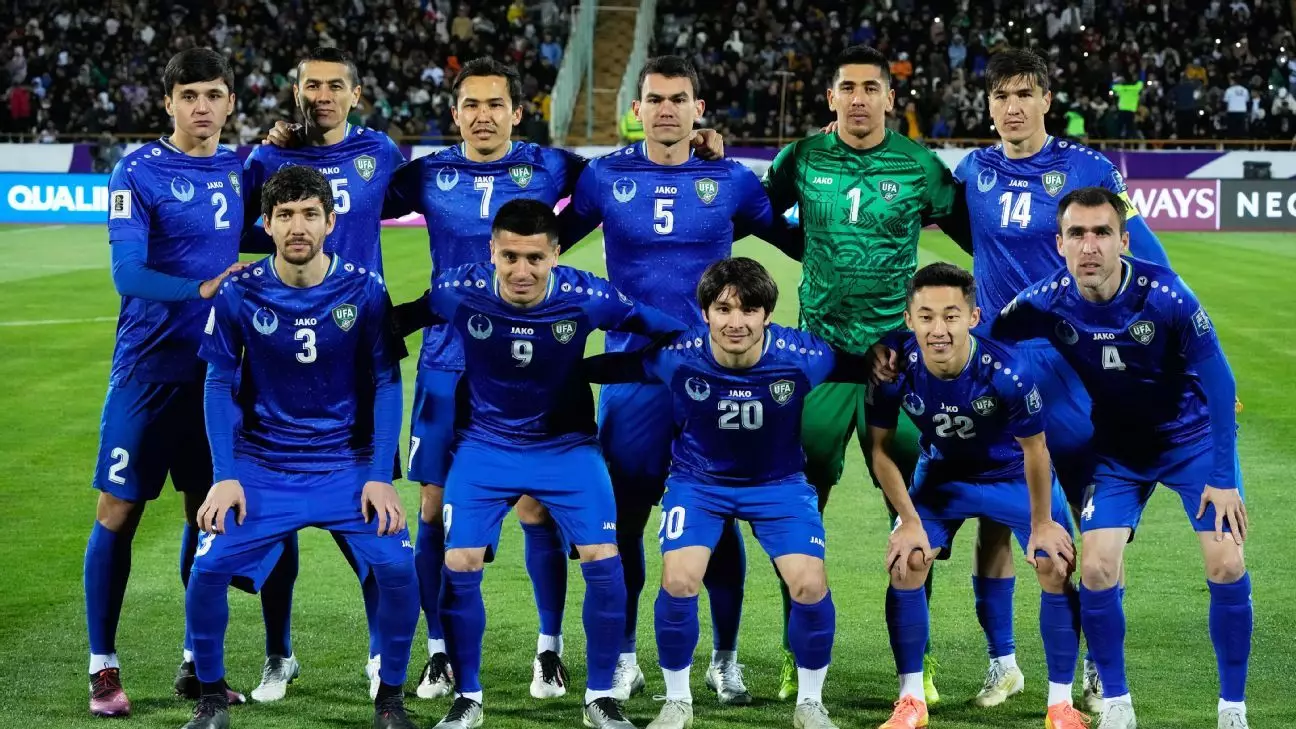In a momentous occasion for Uzbek football, Uzbekistan has successfully clinched a spot in the men’s World Cup finals for the first time, marking an impressive achievement after eight attempts. The team’s 0-0 draw against the United Arab Emirates in Abu Dhabi was not just a game but a defining moment in the nation’s sporting history. This qualification symbolizes a culmination of years of hard work, resilience, and a relentless pursuit of excellence in a country that gained independence from the Soviet Union in 1991.
Utkir Yusupov, the team’s standout goalkeeper, played an instrumental role in this historic match, executing a series of crucial second-half saves. His performance underscored the importance of individual brilliance in team sports and highlighted the often-overlooked role that a goalkeeper can play in determining the outcome of pivotal matches. The magnitude of this achievement will resonate beyond the borders of Uzbekistan, as it sets a precedent that can inspire future generations of athletes in the country.
Implications for Asian Football
Uzbekistan now stands alongside prominent teams such as Japan, New Zealand, Iran, and Argentina as one of the qualified nations for the 2026 World Cup. This highlights a notable shift in the balance of power within Asian football. Countries like Uzbekistan are starting to interrupt the once-dominant narratives held by established football nations in the region, demonstrating that the gap between the traditional powerhouses and emerging teams is narrowing.
Additionally, the World Cup’s co-hosting by the United States, Canada, and Mexico automatically grants those teams entry into the tournament, creating a layer of intrigue regarding the overall competition landscape. As smaller nations like Uzbekistan break through, the diversity of representation in the World Cup will only enhance the tournament’s appeal, potentially leading to electrifying matchups and unforeseen storylines.
The Battle for Additional Spots
While Uzbekistan celebrates, other teams are on the brink of their own success stories. Australia and Jordan are inching closer to qualification, which will add to the competitive fabric of the World Cup. Australia’s position, significantly bolstered by their superior goal difference, allows them some leeway in their upcoming match against Saudi Arabia. This strategic advantage is crucial as they strive for a sixth consecutive World Cup appearance. Their mature understanding of the competition exemplifies the team’s evolution and preparedness.
Jordan’s exhilarating performance, fueled by Ali Olwan’s hat trick against Oman, exemplifies their rising prowess in Asian football. Their prospects hinge on an upcoming match involving South Korea and Iraq, revealing the interconnected nature of these qualifications where the fate of one team can hinge on another’s performance. Such dynamics are what make World Cup qualifiers so thrilling and unpredictable.
Continued Aspirations in Asian Football
The journey doesn’t stop with the World Cup qualification. Teams like Indonesia are also making strides, with a recent victory that secured their advancement to the next qualifying round. This demonstrates that resilience and determination are contagious in the spirit of Asian football. The success of these nations points to a burgeoning competitive atmosphere in the region that could reshape the perception of Asian teams on the world stage.
The 2026 World Cup promises to be a showcase of emerging talents and unexpected rivalries. As Uzbekistan revels in their historic accomplishment, the narrative of underdog triumphs is becoming increasingly prevalent, leaving audiences worldwide eager for the next chapter in this unfolding saga of international football.

Leave a Reply